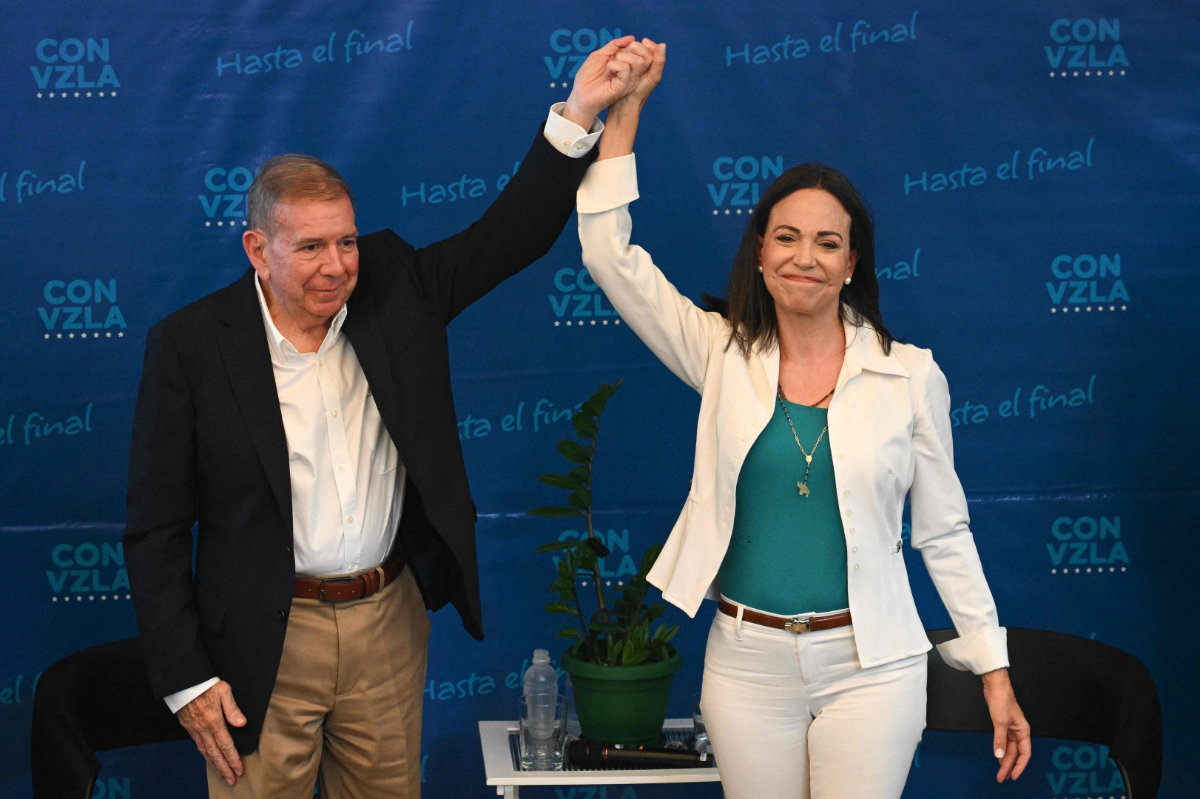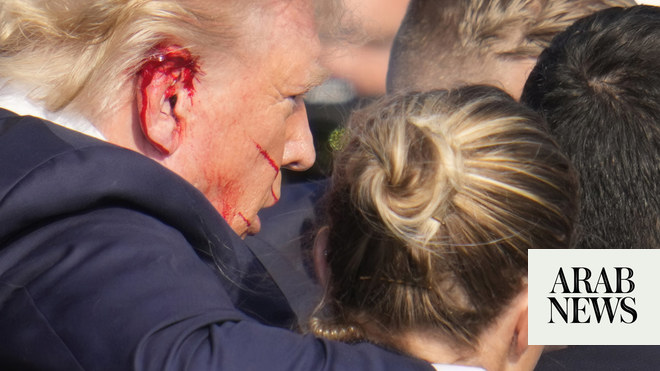CARACAS, Venezuela: Venezuela's future is at stake. Voters will decide Sunday whether to revoke 11-year-old, crisis-plagued President Nicolas Maduro or give the opposition a chance to fulfill its promise to overthrow the ruling party's policies that have crippled the economy and forced millions of people to flee the country.
Long-divided opposition parties have united behind a single candidate, leaving Venezuela's Socialist Party facing its most serious presidential election challenge in decades.
Maduro is being challenged by Edmundo Gonzalez Urrutia, a former diplomat representing a renewed opposition, and eight other candidates. Maduro and Gonzalez supporters formally wrapped up the campaign season on Thursday with a massive protest in the capital, Caracas.

Venezuelan opposition star Maria Corina Machado raises her hand in support of opposition presidential candidate Edmundo Gonzalez Urrutia (L) during a press conference in Caracas on July 25, 2024, ahead of Sunday's presidential election. (AFP)
Here are some reasons why elections are important to the world:
Impact of migration
The election will have an impact on immigration regardless of the winner.
Instability in Venezuela over the past decade has forced more than 7.7 million people to flee, in what the United Nations refugee agency has described as the largest exodus in Latin American history in recent years. Most Venezuelan migrants have settled in Latin America and the Caribbean, but they are increasingly targeting the United States.
A nationwide poll conducted in April by Venezuela-based research firm Delphos found that about a quarter of Venezuelans were considering moving if Maduro were to win again. About 47 percent of them said they would stay in their country if the opposition won the election, but a similar number said a better economy would keep them in their home country. The poll has a margin of error of plus or minus 2 percentage points.
The main opposition leader is not on the ballot.
The most talked-about name in the race is off the ballot: María Corina Machado. The former congresswoman has risen to opposition stardom in 2023, filling the void left by previous opposition leaders who fled into exile. Her principled attacks on government corruption and mismanagement prompted millions of Venezuelans to vote for her in October’s opposition primary.

Venezuelan opposition leader Maria Corina Machado greets supporters as she campaigns for former diplomat Edmundo Gonzalez Urrutia in Caracas, Venezuela, July 25, 2024. (Reuters)
But Maduro's government declared the primary election illegal and opened a criminal investigation into some of its organizers. The government has since issued arrest warrants for several of Machado's supporters and arrested some of her officials, and the country's top court has upheld a decision not to allow her to run.
Yet she continued to campaign, holding rallies across the country and turning her ban into a symbol of the disenfranchisement and humiliation that many voters have felt for more than a decade.
She supported Edmundo Gonzalez Urrutia, a former ambassador who had never held public office, and helped unite the conflicting opposition.
They are campaigning together, promising economic reforms to lure back millions of people who have fled since Maduro took office in 2013.
Gonzalez began his diplomatic career as Venezuela's assistant ambassador to the United States in the late 1970s. He was posted to Belgium and El Salvador, and served as ambassador to Algeria in Caracas. His last post was as ambassador to Argentina during Hugo Chavez's presidency, which began in 1999.
Why is the current president struggling?
Maduro's popularity has waned due to an economic crisis caused by low oil prices, corruption and government mismanagement.
Maduro can still count on a group of die-hard Chavez supporters, including millions of state workers and others whose businesses or jobs depend on the state, but his party's ability to use its access to social programs to sway people to vote has been eroded by the economic downturn.
He is the heir to Hugo Chavez, the famous socialist who expanded Venezuela's welfare state while at odds with the United States.
Chavez had been battling cancer and selected Maduro to serve as interim president after his death. He assumed the role in March 2013 and the following month narrowly won a presidential election triggered by the death of his adviser.
Maduro was re-elected in 2018 in an election that many regard as fraudulent. His government banned Venezuela's most popular opposition party and politician from participating in the election, and because of the lack of equality, the opposition called on voters to boycott the election.
Such authoritarian leanings are part of the reason the US has imposed economic sanctions that have crippled the country's oil sector, its lifeblood.
The oil industry is mismanaged.
Venezuela has the world's largest proven crude oil reserves, but the country's production has declined in recent years, partly due to government mismanagement and widespread corruption at state-owned oil companies.
In April, the Venezuelan government announced the arrest of Tareck El Aissami, a powerful former oil minister and Maduro ally, in an alleged scheme to steal hundreds of millions of dollars in oil proceeds.
That same month, the US government reimposed sanctions on Venezuela's energy sector after Maduro and his allies used the ruling party's total control of Venezuela's institutions to undermine an agreement to allow free elections, including preventing Machado from registering as a presidential candidate and arresting and persecuting members of her team.
The sanctions prevent U.S. companies from doing business with state-run company Petróleos de Venezuela SA, better known as PDVSA, without prior approval from the U.S. Treasury Department. The outcome of the election could determine whether the sanctions remain in place.
An uneven playing field
A freer and fairer presidential election appeared likely last year when Maduro’s government agreed to work with the U.S.-backed Unitary Platform coalition to improve the terms of an October 2023 election. The agreement on the terms of the election gave Maduro’s government broad relief from U.S. economic sanctions on the state-run oil, gas and mining sectors.
But days later, authorities condemned the opposition group's actions as illegal and began issuing arrest warrants and arresting human rights defenders, journalists and opposition members.
A UN-backed commission investigating human rights abuses in Venezuela has reported that the government has stepped up its crackdown on critics and opponents ahead of the election, subjecting targets to arbitrary detention, tracking, harassment, defamation and criminal prosecution.
The government also used its control of the country's media, oil resources, power grids and other infrastructure to limit the scope of Machado-Gonzalez's campaign.
The escalating actions against the opposition prompted the Biden administration to end sanctions relief it had granted in October earlier this year.
